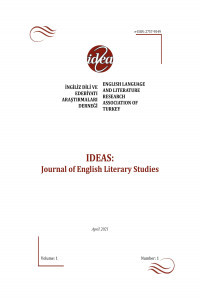Dissolved State and Identity in John Maxwell Coetzee’s Life and Times of Michael K within the scope of the Postcolonial Other
Dissolved State and Identity in John Maxwell Coetzee’s Life and Times of Michael K within the scope of the Postcolonial Other
Regardless of the situation, human rights are expected to be maintained and safeguarded. We can infer from this that such rights are automatically terminated in times of war. Michael K’s futile attempts to obtain travel documents to Cape Town lawfully serve as an example of how much people rely on the efficient operation of all governmental institutions, while his entire life demonstrates the significance of personal freedom and freedom of movement. Michael K keeps quiet, not only because he is alone for most of his life, but also because silence is a subliminal kind of resistance. It makes no difference if K is conscious of his heroic resistance or not; what counts is that he says very little because he has nothing to say. He is reluctant to share his tale. He doesn’t want to be recognized, perceived, or misinterpreted.
This paper touches upon the issues of dissolution of the individual, silence, other, state, and the position of the traumatized and the otherized in the gruesome and cruel apartheid in South Africa by scrutinizing the major points in John Maxwell Coetzee’s Life and Times of Michael K. Postcolonial theorists’ views are also prioritized in the analysis of the novel concerning the aforementioned concepts and the theoretical background is formed in accordance with the other, dissolution of state and silence.
Keywords:
Other, Michael K, Silence, Dissolved State Apartheid,
___
- Achebe, Chinua. An Image of Africa and The Trouble with Nigeria. Penguin Books, London, 1983.
- Arendt, Hannah. The Origins of Totalitarianism. New York: Meridian Books, 1958.
- Ashcroft, Bill, Griffith. Gareth, & Tiffin, Helen. Key concepts in postcolonial studies. New York: Routledge, 1998.
- Babcock, David. “Professional Subjectivity and the Attenuation of Character in J. M. Coetzee’s ‘Life & Times of Michael K.’” PMLA, vol. 127, no. 4, 2012, pp. 890–904. JSTOR, http://www.jstor.org/stable/23489094. Accessed 28 Jul. 2022.
- Bolin, John. "Modernism, Idiocy, and the Work of Culture: J. M. Coetzee’s Life & Times of Michael K." Modernism/modernity, vol. 22 no. 2, 2015, p. 343-364. Project MUSE, doi:10.1353/mod.2015.0029.
- Canepari-Labib, Michela. “Language and Identity in the Narrative of J. M. Coetzee.” English in Africa, vol. 27, no. 1, 2000, pp. 105–30. JSTOR, http://www.jstor.org/stable/40238894. Accessed 28 Jul. 2022.
- Canepari-Labib, Michela. Old Myths-ModernEmpires. 2005, doi:10.1604/9783039102624.
- Coetzee, J.M. (1985). Life & Times of Michael K. Penguin Books, New York.
- Dragunoiu, Dana. “J.M. Coetzee’s Life & Times of Michael K and the Thin Theory of the Good.” The Journal of Commonwealth Literature, vol. 41, no. 1, Mar. 2006, pp. 69–92,
- Fanon, Frantz. The Wretched of the Earth. Penguin Books, London, 2001.
- Gallagher, Susan V. A Story of South Africa. Cambridge, Mass.: Harvard UP, 1991, doi:10.1604/9780674839724.
- Geçikli, Kubilay. Coetzee Romanı: Kadın İtirafçılar. Çizgi Kitabevi, 2019.
- Loomba, Ania. Colonialism/Postcolonialism (The New Critical Idiom). Routledge, London, 2005.
- Mike Marais. “One of those islands without an owner”: The aesthetics of space in Robinson Crusoe and J M Coetzee's life & times of Michael K, Current Writing: Text and Reception in Southern Africa, 8:1, 19-32, 1996.
- Memmi, Albert. The Colonizer and the Colonized. (trans.) Howard Greenfeld, Earth¬scan Publications Ltd., London, 2003.
- Menon, Anand. A Post-Colonial Insight to Chinua Achebe’s African Trilogy. Bridge Center, Romania, 2015.
- Mills, Catherine. Life Beyond Law: Biopolitics, Law and Futurity in Coetzee’s Life & Times of Michael K. Griffith Law Review, 2006, 15.1: 177-195.
- Said, E.dward. Culture and Imperialism. Vintage Books, New York, 1993.
- Said, Edward. Orientalism. Vintage Books, New York, 1994.
- Slater, Michelle. Review of Race After Sartre: Antiracism, Africana Existentialism, Postcolonialism. MLN, vol. 124 no. 4, 2009, p. 999-1004. Talen, Karin. The Outsider and the ‘Other’ in Life & Times of Michael K: A Postcolonial Reading, Linnaeus University, School of Languages and Literature/English, 2012.
- Teimouri, Mahdi. Place and the Politics of Space in JM Coetzee’s Life and Times of Michael K. 3L: Language, Linguistics and Literature, The Southeast Asian Journal of English Language Studies, 2016 22 (1). pp. 29-38.
- Vital, Anthony. “Toward an African Ecocriticism: Postcolonialism, Ecology and ‘Life & Times of Michael K.’” Research in African Literatures, vol. 39, no. 1, 2008, pp. 87–106. JSTOR, http://www.jstor.org/stable/20109561. Accessed 28 Jul. 2022.
- Wright, Timothy. The art of evasion: writing and the state in JM Coetzee's Life & Times of Michael K. Journal of Literary Studies, 2012, 28.3: 55-76.
- Yeh, Chuan Rong. Existential thoughts in Fanon’s post-colonialism discourse. Policy Futures in Education, 2013, 11.2: 200-215.
- Başlangıç: 2021
- Yayıncı: İngiliz Dili ve Edebiyatı Araştırmaları Derneği / English Language and Literature Research Association of Turkey
